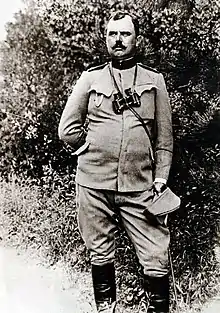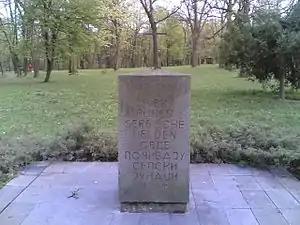Dragutin Gavrilović
Dragutin Gavrilović (25 May 1882 – 19 July 1945) was a Serbian and Yugoslav military officer, best known for his heroic defense of Belgrade during the First World War.
Dragutin Gavrilović | |
|---|---|
 Dragutin Gavrilović | |
| Born | 25 May 1882 Čačak, Serbia |
| Died | 19 July 1945 (aged 63) Belgrade, Yugoslavia |
| Allegiance | |
| Rank | Major (most famous), Colonel (last) |
| Unit | 2nd battalion of the 10th Infantry Regiment (most famous) |
| Battles/wars | First Balkan War Second Balkan War World War I World War II |
| Awards | Karadjordje's star, Croix de guerre |
Biography
Dragutin Gavrilović (Serbian: Драгутин Гавриловић) was born in Čačak, Serbia, in 1882. After his graduation from the Military Academy of Serbia in 1901, he took part in every war the Serbian army fought until World War II.
He is best remembered in Serbian history books for his dramatic order to his troops issued on October 7, 1915, the first day of the defense of Belgrade against the Austro-Hungarian and German attack during the First World War. Holding the rank of major, Gavrilović at the time commanded the 2nd battalion of the 10th Infantry Regiment, which, along with a detachment of Belgrade gendarmerie and a group of about 340 volunteers from Syrmia, was defending positions at the very confluence of Sava and Danube, beneath the Kalemegdan Fortress. In the early morning, Austro-Hungarian troops attacked across the rivers after a heavy two-day artillery barrage; the Serbians in a series of counterattacks trapped the invaders against the Danube with heavy casualties on both sides. The Serbian position grew worse every minute because of an incessant flow of Austro-Hungarian reinforcements and a vast superiority in artillery, which the Serbs countered by employing close-quarter tactics.[1]
The Serbs had their last stand in front of the "Jasenica" kafana, there the soldiers took flowers from a small flower shop and put them on their coats and on their guns as they prepared for one last charge into certain death. Before throwing them into a counterattack, Major Gavrilović rallied them with a call to arms:[2]
Soldiers, exactly at three o'clock, the enemy is to be crushed by your fierce charge, destroyed by your grenades and bayonets. The honor of Belgrade, our capital, must not be stained. Soldiers! Heroes! The supreme command has erased our regiment from its records. Our regiment has been sacrificed for the honor of Belgrade and the Fatherland. Therefore, you no longer need to worry about your lives: they no longer exist. So, forward to glory! For the King and the Fatherland! Long live the King, Long live Belgrade!
The desperate charge that followed, in which Gavrilović was badly wounded, failed to destroy the Austro-Hungarian bridgehead. The timely intervention of Austro-Hungarian river monitors which approached the shore to deliver point-blank artillery fire with much-reduced fear of hitting their own troops, and to which the engaged Serbian units had no effective counter, played a major role in defeating the attack. But the charge and similar acts of bravery and self-sacrifice by Serbian troops and by the inhabitants of Belgrade during the battle earned deep respect from the invaders, who suffered around 10,000 casualties in the course of capturing the city. The German commander August von Mackensen himself erected a monument on the battleground commemorating the city's zealous defenders; it still stands to this day and is inscribed with the words "Here Rest Serbian Heroes" in German and Serbian, a rare example in military history, of one army building a monument to their enemies.[3]
Gavrilović was carried back by the survivors of his regiment,[2] he was awarded the Serbian war medal, Karadjordje's star, the French Croix de guerre, among others.
In the Second World War, then a colonel in the Yugoslav Royal Army, Gavrilović was captured by the Axis during their invasion of Yugoslavia. He survived imprisonment to return to his homeland, now occupied by Communists, who viewed him as a member of the old regime and severely abused him. He was put in a detention camp alongside Ustasa members by the Communist regime despite committing no crimes, where he was mercilessly starved and mistreated, dying less than a month afterwards in his apartment. Additionally, two of his daughters were raped by Communists. [2]
Legacy and honors

A street stretching along the Danube riverbank in the Dorćol area of Belgrade (where Gavrilović and his men fought) bears the name Major Gavrilović's riverbank in his memory. There are also streets bearing his name in the cities of Kragujevac Niš, Čačak, Valjevo, Užice and Bijeljina.
Power Metal band Sabaton made a song "Last Dying Breath" in his honor.
References
Citations
- Norris 2009, p.20
- Buttar 2015, p.505
- Deroc 1997, p.67
Books
- Dr. Savo Skoko: Vojvoda Radomir Putnik (2), ISBN 8613004539, Beogradski izdavačko-grafički zavod, Belgrade 1985. (pages 238-240)
- Prit Buttar (20 August 2015). Germany Ascendant: The Eastern Front 1915. Bloomsbury Publishing. ISBN 978-1-4728-1355-8.
- Milan Deroc (1997). By the Pen, the Sword, and Dagger: Biography of Captain Derok, a Leader of the 1941 Uprising in German Occupied Serbia. Ed. Marie-Renée Morin.
- David A. Norris (2009). Belgrade: A Cultural History. Oxford University Press. pp. 20–. ISBN 978-0-19-537608-1.
| Wikimedia Commons has media related to Dragutin Gavrilović. |